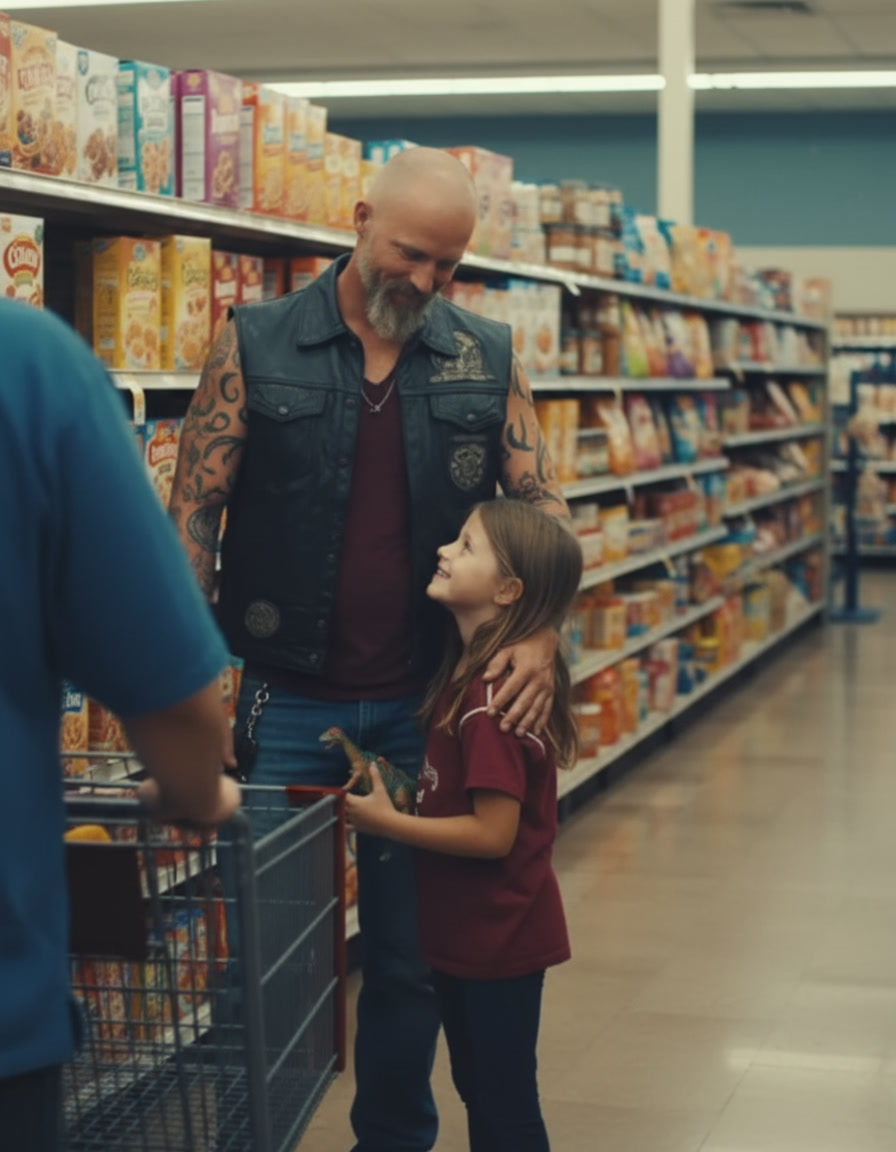I never imagined a simple Walmart trip could change my life. At sixty-three, with a beard mostly gray, tattoos winding up my arms, and scars mapping out decades of living on the edge, I thought I’d seen it all. Fistfights in bars, endless nights on the highway that felt like they might swallow me whole, the kind of chaos most men fear — I’d been there. But nothing, absolutely nothing, compared to what happened that afternoon in the cereal aisle.
I was reaching for a box of my usual oats when I felt it: tiny hands clutching the back of my leather vest, the one with my club patch that usually made people give me space. I turned slowly and saw a little girl, maybe six years old, trembling as if she’d run barefoot through a snowstorm.
Her eyes were wide, wet with fear. She whispered, barely audible: “Please… pretend you’re my dad.”
The words hit me harder than any fight ever could. I knelt to her level. “What’s happening, sweetheart?” I asked, keeping my voice low and calm.
Before she could answer, a man came barreling down the aisle, face red, chest heaving, calling her name like a threat rather than a search. He looked unhinged, the kind of man you don’t turn your back on.
The girl — Addison — pressed herself into me, shaking so hard I felt it through my jeans. “He’s not my dad,” she whispered. “Something happened at home. My mom… she wasn’t moving.”
Every instinct I had, honed over decades of reading danger before it struck, kicked in. I moved so she was behind me and stood up, blocking her from his approach.
He froze when he saw who she clung to. Broad shoulders, leather vest, tattoos — decades of experience in my eyes. He scanned me, calculating whether he could force his way past without anyone intervening.
I didn’t speak. Didn’t have to. My eyes said it all: he’d have to go through a man who’d fought for his life more times than he could count before touching her.
He hesitated, jaw tight, and then stepped forward anyway.
“What are you doing with my daughter?” he demanded, voice too loud, too rehearsed.
“She’s not your daughter,” I said firmly. “And she doesn’t want to go with you.”
A few shoppers slowed, some stopped entirely. Addison gripped my vest as if letting go meant losing the last thread of safety.
“She’s confused,” he insisted. “She ran off.”
“She’s terrified,” I corrected. “That’s not the same thing.”
For a second, I thought he might strike, but the growing audience made him falter. Abusers don’t like witnesses. I pulled out my phone and dialed 911, keeping my eyes on him. “Child reporting danger at home. Man trying to take her,” I said clearly.
The moment he realized I was calling the police, he bolted. Down the aisle he went, nearly toppling a display of cookies, disappearing before anyone could stop him.
I knelt beside Addison. She was shaking, tears streaming silently down her cheeks. “You’re safe,” I said. “I’m not going anywhere.”
Police arrived within minutes. I stayed with her as they asked questions. She told them through trembling breaths about seeing her mother unresponsive and the man screaming at her when she tried to call for help. Officers rushed to the house while Addison clutched my hand like she was afraid I’d vanish. When dispatch confirmed her mother was alive and getting medical attention, Addison broke down, sobbing with relief and lingering fear.
Child Protective Services arrived soon after. They tried to coax her away, gently, but she refused to let go of me. I stayed. I gave every detail I knew and promised her I wouldn’t leave until she felt safe.
That moment marked the start of something neither of us expected.
Addison stayed with me temporarily while her mother recovered. Those first nights were rough. She’d wake screaming, crying. I let her sleep on the couch with the TV on low so she’d know she wasn’t alone. Gradually, she warmed to life with me — riding on the back of my bike in the driveway, helping stir pancake batter, discovering the small joys of safety and attention.
Trust doesn’t grow overnight, especially in a child raised in fear. But slowly, with patience and consistency, she started to laugh, to rest, to heal.
Her mother eventually recovered, rebuilt her life, remarried, and created a stable home. When Addison returned full-time, she insisted we remain a part of each other’s lives — not because I demanded it, but because she wanted it.
Seven years have passed. Addison is thirteen now. Each month, she comes by with notebooks full of stories, school projects, and new dreams. She calls me “Grandpa Bear” — big, grumpy-looking, but secretly soft.
People still see me as a rough biker, but Addison taught me something I never expected at sixty-three: sometimes the people you protect choose you. And once they do, you don’t let them down.
I’ve faced battles across states, patched up men after bar fights, stood my ground where standing your ground could get you killed. But nothing has mattered as much as the day a terrified six-year-old grabbed my vest and trusted me with her life.
She changed my world in return. And every time she calls me Grandpa Bear, I remember: the scariest-looking man in the room can be the safest place for a child when the world goes dark.
